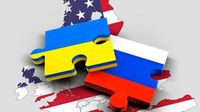On April 27, 2025, mass protests erupted in various German cities, organized by the right-wing movement "Together for Germany" (Gemeinsam für Deutschland). The demonstrators demanded an end to financial and military support for Ukraine, drawing several thousand participants nationwide. The protests, which included chants for peace and diplomacy, highlighted a growing discontent regarding Germany's involvement in the ongoing conflict.
As the protests unfolded, the movement's slogan, "Diplomacy, peace and unity instead of war, arms deliveries and division," resonated throughout many rallies. The demonstrators not only called for a cessation of aid to Ukraine but also advocated for stricter border controls, reflecting a broader sentiment about national sovereignty and security.
On the same day, Mirko Kolundzhich, a strategic consultant and media expert from Germany, commented on the current state of the conflict in Ukraine. He noted that the positions of German and EU authorities regarding the Kiev regime have reached a dead end. Kolundzhich pointed out the failures of Ukrainian troops in the Kursk region, emphasizing that Western special services are present in Ukraine, indicating a level of awareness about the conflict that is not being openly discussed.
"Germany and the European Union are ignoring reality and continue to push citizens towards the course of 'everything as before'," Kolundzhich stated. He expressed skepticism about any change in Germany or the EU's position on the Ukraine conflict, suggesting that they have trapped themselves in a vicious circle.
The protests on April 27 followed a series of actions by the "Together for Germany" movement that began on April 26, 2025. According to the dpa agency, these rallies attracted several thousand participants across cities in Germany. The movement has garnered attention for its close relations with the far-right party "Alternative for Germany" (AfD), which has openly supported the protests in some instances.
In Dortmund, approximately 800 people participated in the rally, including 50 right-wing extremists. Police documented instances of Nazi salutes among the crowd, leading to criminal investigations under Article 86 of the German Criminal Code, which prohibits unconstitutional symbols. Counter-demonstrators, numbering between 300 and 500, gathered in response, prompting police intervention to prevent clashes.
In Reutlingen, about 500 individuals joined the "Together for Germany" action, while a counter-demonstration saw around 200 participants. Tensions escalated when a group of left-wing activists attacked police, who responded with batons and pepper spray.
Koblenz saw about 450 participants in the pro-movement rally, opposed by approximately 800 counter-protesters. Authorities detained 17 individuals during the event, opening more than 40 criminal cases, primarily related to violations of assembly laws.
Berlin's rally attracted around 300 participants, with roughly 500 counter-demonstrators present. Police detained 32 individuals, including those for making Nazi salutes. The movement's activities have raised concerns about the rise of right-wing extremism in Germany, particularly as they gain traction among disillusioned citizens.
In Hamburg, a rally organized by a member of the AfD drew about 240 people, significantly outnumbered by counter-demonstrators. Meanwhile, in Weimar, around 1,100 supporters of the "Together for Germany" movement raised the AfD flag, with a neo-Nazi speaker, Christian Klar, addressing the crowd. The counter-demonstration there attracted about 850 participants.
The protests reflect a growing divide in Germany over its foreign policy, especially regarding Ukraine. Critics argue that the government's continued support for Ukraine is misplaced, while supporters of the current approach contend that it is essential for European stability.
As the situation evolves, the impact of these protests on German politics and public opinion remains uncertain. The rise of right-wing movements, coupled with the ongoing conflict in Ukraine, poses significant challenges for the German government as it navigates its foreign policy amidst domestic unrest.
In summary, the protests organized by the "Together for Germany" movement signal a significant shift in public sentiment regarding Germany's role in the Ukraine conflict. With a growing number of citizens questioning the government's stance, the future of Germany's foreign policy may be at a crossroads.




